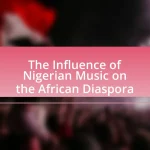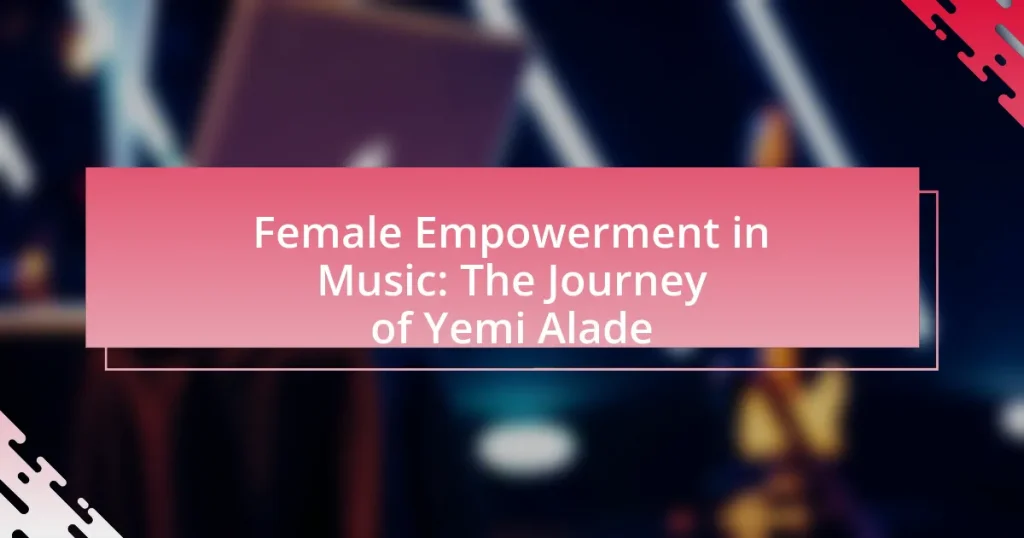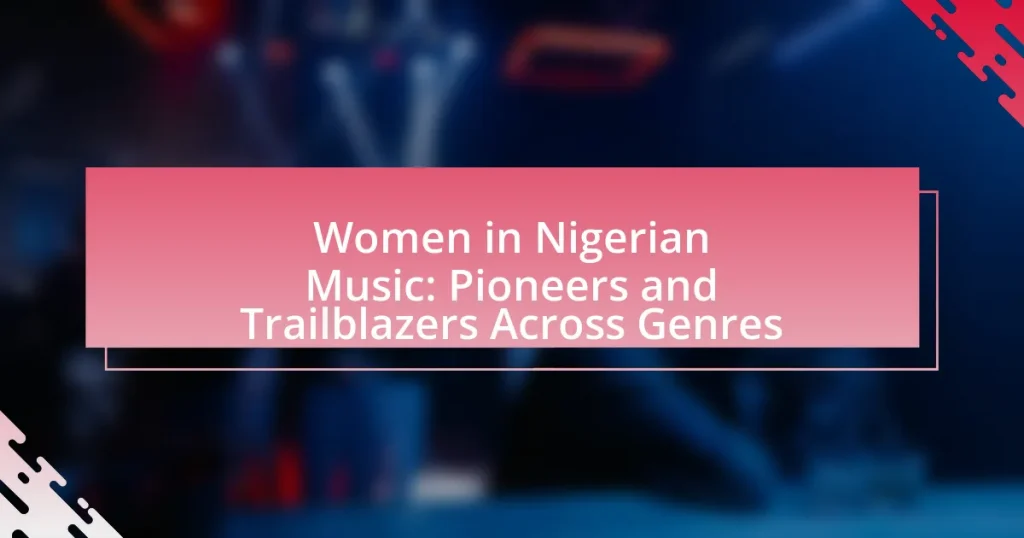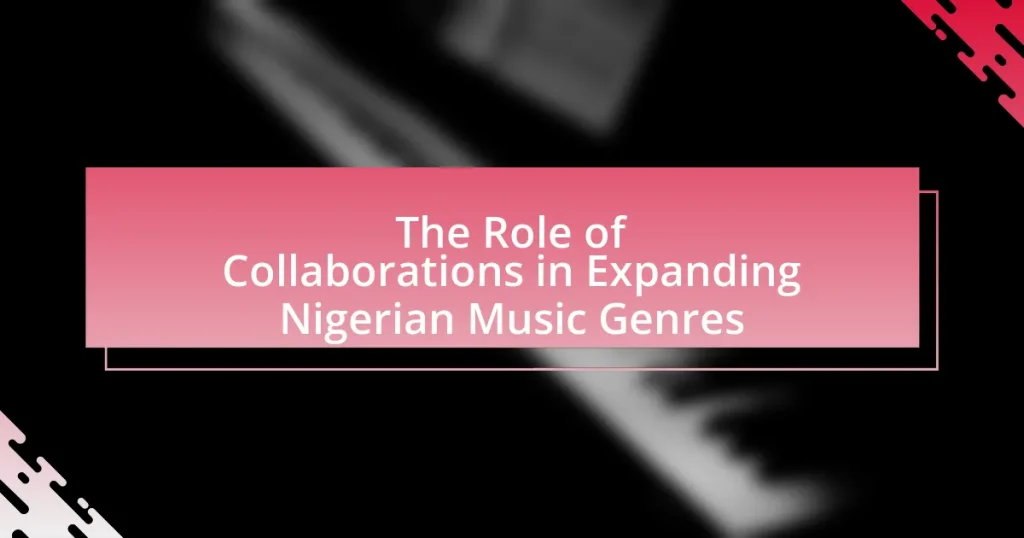Female empowerment in music is a critical movement that advocates for women’s rights, equality, and representation within the industry. This article explores the journey of Yemi Alade, a prominent Nigerian artist who exemplifies female empowerment through her music and advocacy. It highlights her significant achievements, including her rise to fame with the hit song “Johnny,” and discusses how her work challenges gender stereotypes and promotes cultural pride. Additionally, the article examines the historical milestones for women in music, the impact of female representation, and the broader implications of female empowerment on societal perceptions of gender roles.
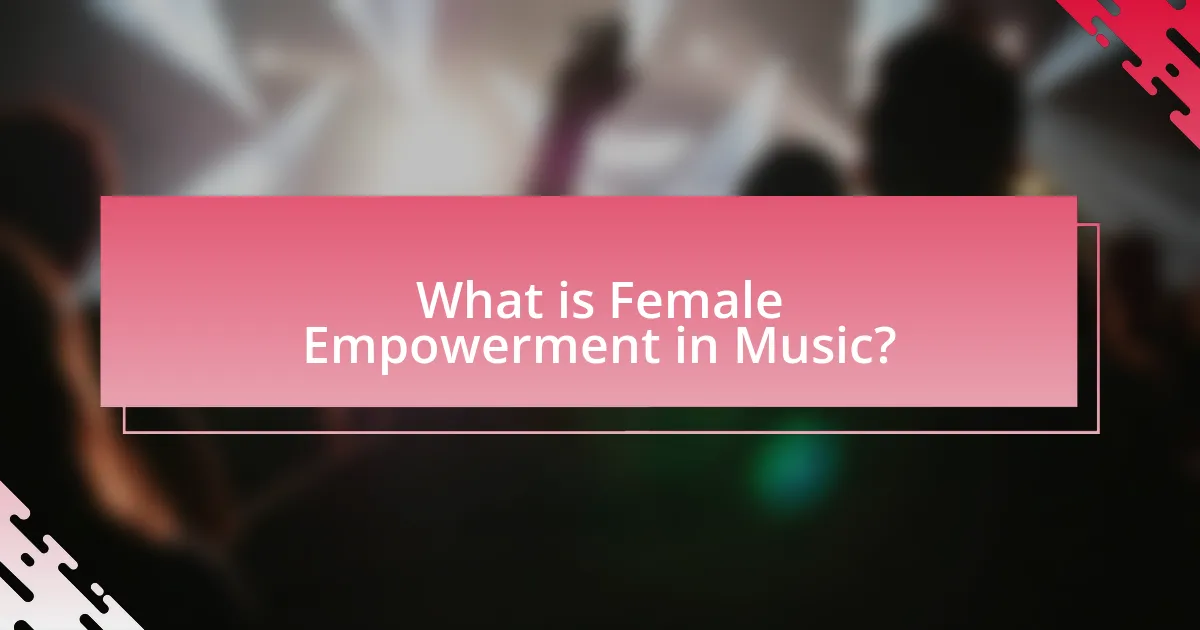
What is Female Empowerment in Music?
Female empowerment in music refers to the promotion of women’s rights, equality, and representation within the music industry and its narratives. This empowerment manifests through the creation of music that challenges gender stereotypes, highlights women’s experiences, and advocates for social change. For instance, artists like Yemi Alade use their platforms to address issues such as gender inequality and cultural identity, thereby inspiring other women to assert their voices and pursue their ambitions in a traditionally male-dominated field. The impact of female empowerment in music is evident in the increasing visibility of female artists and the growing support for initiatives that foster gender equality in the industry.
How does female empowerment manifest in the music industry?
Female empowerment in the music industry manifests through increased representation, creative control, and the promotion of female narratives. Artists like Yemi Alade exemplify this by breaking barriers in genres traditionally dominated by men, achieving commercial success, and using their platforms to advocate for women’s rights and social issues. For instance, Yemi Alade’s hit songs often celebrate African culture and female strength, contributing to a broader movement that encourages women to express themselves freely and assertively in a male-dominated space. This shift is supported by statistics showing that female artists are increasingly occupying top chart positions and leading major music festivals, indicating a growing acceptance and celebration of women’s contributions to the industry.
What are the historical milestones for women in music?
Historical milestones for women in music include the emergence of female composers in the 18th century, such as Fanny Mendelssohn, who challenged gender norms by publishing her works. In the 20th century, women like Billie Holiday and Aretha Franklin became icons, influencing genres like jazz and soul, while the feminist movement in the 1970s led to increased visibility for female artists. The introduction of the Grammy Awards in 1959, which recognized female talent, marked a significant acknowledgment of women’s contributions to music. Additionally, the rise of female-led bands in the 1990s, such as The Spice Girls, showcased women’s empowerment in popular music. These milestones collectively illustrate the evolving role of women in the music industry, highlighting their impact and contributions throughout history.
How do female artists influence societal perceptions of gender roles?
Female artists influence societal perceptions of gender roles by challenging traditional norms and presenting diverse representations of femininity. Through their music, lyrics, and public personas, they often advocate for gender equality, empowerment, and self-expression. For instance, artists like Yemi Alade use their platforms to address issues such as body positivity and independence, which resonate with audiences and inspire change. Research indicates that female musicians who portray strong, independent characters can shift public attitudes towards women’s roles in society, as seen in studies highlighting the impact of female-led movements in the music industry on cultural perceptions.
Why is female empowerment important in music?
Female empowerment is important in music because it promotes diversity, representation, and equality within the industry. Empowering female artists allows for a broader range of perspectives and experiences to be shared, enriching the musical landscape. For instance, studies show that female-led songs often address themes of resilience and social justice, resonating with audiences and inspiring change. Furthermore, the presence of empowered female musicians can challenge stereotypes and encourage young girls to pursue careers in music, as evidenced by the rise of artists like Yemi Alade, who not only showcases talent but also advocates for women’s rights and empowerment through her work.
What impact does female representation have on the music industry?
Female representation significantly enhances the music industry by promoting diversity, driving innovation, and influencing cultural narratives. Research indicates that increased visibility of female artists leads to a broader range of musical styles and themes, enriching the industry. For instance, a study by the Annenberg Inclusion Initiative found that female artists accounted for only 21.6% of all artists on the Billboard Hot 100 from 2012 to 2019, highlighting the need for greater representation. This lack of representation limits the industry’s potential for creativity and connection with diverse audiences. Furthermore, female artists often address social issues, empowering listeners and fostering discussions around gender equality and representation. Thus, female representation not only diversifies the music landscape but also plays a crucial role in shaping societal attitudes and cultural conversations.
How does female empowerment contribute to cultural change?
Female empowerment contributes to cultural change by challenging traditional gender roles and promoting equality, which leads to shifts in societal norms and values. When women gain access to education, leadership positions, and creative expression, they influence cultural narratives and inspire future generations. For instance, the rise of female artists like Yemi Alade in the music industry not only showcases women’s talents but also encourages discussions around gender equality and representation. This cultural shift is evidenced by increased visibility of women in various sectors, which has been linked to broader acceptance of diverse perspectives and lifestyles, ultimately fostering a more inclusive society.

Who is Yemi Alade?
Yemi Alade is a Nigerian singer, songwriter, and actress known for her contributions to the Afropop genre. She gained international recognition with her hit single “Johnny,” which topped charts across Africa and showcased her unique blend of African rhythms and contemporary sounds. Alade has received numerous awards, including the MTV Africa Music Award for Best Female, affirming her influence and success in the music industry. Her work often emphasizes themes of female empowerment and cultural pride, making her a prominent figure in promoting African music globally.
What are the key milestones in Yemi Alade’s career?
Yemi Alade’s career milestones include winning the Peak Talent Show in 2009, which launched her into the music industry. She gained international recognition with her hit single “Johnny” in 2013, which topped charts across Africa and garnered millions of views on YouTube. In 2016, she released her second studio album, “Mama Africa,” which solidified her status as a leading African artist. Alade has also received numerous awards, including the MTV Africa Music Award for Best Female in 2015 and the African Muzik Magazine Award for Best Female West Africa in 2016. Additionally, her participation in global platforms, such as performing at the 2019 Global Citizen Festival, highlights her influence and reach in promoting African music worldwide.
How did Yemi Alade rise to fame in the music industry?
Yemi Alade rose to fame in the music industry primarily through her victory in the 2009 Peak Talent Show, which showcased her vocal talent and stage presence. Following this breakthrough, she gained significant recognition with her hit single “Johnny” in 2013, which became a viral sensation across Africa and beyond, amassing millions of views on YouTube. This song’s success established her as a prominent figure in the Afropop genre, leading to multiple awards, including the MTV Africa Music Award for Best Female. Alade’s consistent release of chart-topping singles and her dynamic performances further solidified her status in the industry, making her a leading voice in female empowerment within music.
What are some of her most significant achievements?
Yemi Alade’s most significant achievements include winning the MTV Africa Music Award for Best Female in 2015 and being nominated for the International Achievement Award at the 2019 UK Music Video Awards. She gained international recognition with her hit single “Johnny,” which has over 200 million views on YouTube, showcasing her influence in the African music scene. Additionally, Alade has been a prominent advocate for female empowerment, using her platform to promote women’s rights and inspire young women across Africa. Her contributions to music and advocacy have solidified her status as a leading figure in the industry.
How does Yemi Alade embody female empowerment in her music?
Yemi Alade embodies female empowerment in her music by promoting themes of independence, strength, and self-confidence. Her lyrics often celebrate women’s resilience and encourage listeners to embrace their identities and assert their rights. For instance, in her hit song “Johnny,” she addresses themes of love and betrayal while showcasing a woman’s perspective, emphasizing emotional strength and self-worth. Additionally, Alade’s public persona and performances often feature strong, confident imagery that inspires women to take charge of their lives. This alignment with empowerment is further supported by her active engagement in social issues affecting women, making her a role model in the music industry.
What themes of empowerment are present in her lyrics?
Yemi Alade’s lyrics prominently feature themes of self-confidence, resilience, and independence. These themes empower listeners by promoting the idea that individuals can overcome challenges and assert their identities. For instance, in her hit song “Johnny,” she expresses the strength of moving on from a failed relationship, illustrating personal empowerment through self-worth. Additionally, her song “Shekere” celebrates cultural pride and female strength, reinforcing the message that women can embrace their heritage while standing strong in their individuality. These lyrical themes resonate with audiences, encouraging them to embrace their power and agency in various aspects of life.
How does Yemi Alade’s image and persona promote empowerment?
Yemi Alade’s image and persona promote empowerment by embodying confidence, independence, and cultural pride. Through her music and public appearances, she consistently showcases themes of female strength and resilience, encouraging women to embrace their identities and pursue their ambitions. For instance, her hit song “Johnny” not only highlights a woman’s perspective on love and betrayal but also serves as an anthem for self-assertion. Additionally, Alade’s active engagement in social issues, such as advocating for women’s rights and participating in initiatives like the “Girls for Girls” campaign, reinforces her commitment to empowering women across Africa. This multifaceted approach positions her as a role model, inspiring many to challenge societal norms and strive for personal empowerment.

What challenges has Yemi Alade faced in her journey?
Yemi Alade has faced several challenges in her journey, including industry competition, cultural barriers, and the struggle for recognition in a male-dominated music scene. The competitive nature of the African music industry often makes it difficult for female artists to gain visibility and support. Additionally, cultural expectations and stereotypes can hinder women’s artistic expression and opportunities. Alade has also navigated the complexities of maintaining her identity and authenticity while appealing to a diverse audience, which is crucial for her success as a global artist.
How have societal norms impacted Yemi Alade’s career?
Societal norms have significantly influenced Yemi Alade’s career by shaping her artistic expression and public persona. As a prominent female artist in a male-dominated industry, Alade has navigated cultural expectations regarding gender roles and representation in music. For instance, her hit song “Johnny” not only showcases her vocal talent but also challenges traditional views on women’s independence and agency in relationships. Furthermore, Alade’s commitment to celebrating African culture through her music and fashion choices aligns with a growing societal shift towards valuing authenticity and diversity in the entertainment industry. This alignment has garnered her a substantial following and recognition, reinforcing the impact of societal norms on her career trajectory.
What obstacles has she overcome as a female artist?
Yemi Alade has overcome significant obstacles as a female artist, including gender bias in the music industry and cultural stereotypes. Gender bias often manifests in unequal opportunities and recognition compared to male counterparts, which Alade has navigated by consistently producing chart-topping hits and gaining international acclaim. Additionally, cultural stereotypes in Nigeria can limit female artists’ visibility and acceptance; however, Alade has challenged these norms through her powerful performances and advocacy for women’s rights, exemplified by her participation in campaigns like the “HeForShe” movement. These efforts have not only solidified her position in the industry but have also inspired other female artists to pursue their careers despite similar challenges.
How does she address gender inequality in her work?
Yemi Alade addresses gender inequality in her work by promoting female empowerment through her music and public persona. She often highlights women’s strength and resilience in her lyrics, using her platform to challenge societal norms that perpetuate gender discrimination. For instance, her song “Johnny” not only showcases her vocal talent but also tells a story that resonates with women’s experiences, encouraging them to assert their independence. Additionally, Alade actively participates in initiatives that support women’s rights, further solidifying her commitment to combating gender inequality in the music industry and beyond.
What role does collaboration play in Yemi Alade’s music?
Collaboration plays a significant role in Yemi Alade’s music by enhancing her artistic expression and broadening her audience reach. Through partnerships with various artists across genres, such as her collaborations with international musicians like Angelique Kidjo and Rick Ross, Alade infuses diverse musical styles into her work, which enriches her sound and promotes cultural exchange. These collaborations not only showcase her versatility but also amplify her message of female empowerment, as they often highlight the strength and creativity of women in the music industry.
How does she collaborate with other female artists?
Yemi Alade collaborates with other female artists through joint performances, co-writing songs, and participating in female-centric music projects. For instance, she has worked with artists like Tiwa Savage and has been involved in initiatives that promote female empowerment in the music industry, such as the “Women in Music” campaign. These collaborations not only enhance her musical repertoire but also foster a supportive network among female musicians, contributing to a more inclusive environment in the industry.
What impact do these collaborations have on female empowerment?
Collaborations in music significantly enhance female empowerment by providing visibility and amplifying the voices of women artists. For instance, Yemi Alade’s partnerships with other female musicians not only showcase their talents but also challenge gender stereotypes within the industry. Research indicates that female artists who collaborate often experience increased audience reach and engagement, which can lead to greater opportunities and recognition. This is evident in the success of songs featuring multiple female artists, which often perform better on charts, thereby reinforcing the importance of female solidarity in music.
What can we learn from Yemi Alade’s journey?
Yemi Alade’s journey teaches us the importance of resilience and authenticity in the music industry. As a prominent Nigerian artist, she has faced numerous challenges, including navigating a male-dominated industry and overcoming cultural barriers. Her success, highlighted by her hit song “Johnny,” which garnered over 200 million views on YouTube, exemplifies how staying true to one’s roots and embracing cultural identity can lead to global recognition. Alade’s commitment to empowering women through her music and advocacy further illustrates the impact of using one’s platform for social change, inspiring many to pursue their passions despite obstacles.
What best practices can emerging female artists adopt from her experience?
Emerging female artists can adopt the best practice of building a strong personal brand from Yemi Alade’s experience. Alade has successfully cultivated a unique identity that resonates with her audience, which is crucial for standing out in a competitive industry. Additionally, she emphasizes the importance of networking and collaboration, as her partnerships with various artists have expanded her reach and influence. Alade’s commitment to authenticity in her music and message also serves as a vital lesson; staying true to one’s roots and experiences can foster a deeper connection with fans. Furthermore, her proactive approach to engaging with social issues through her art demonstrates the impact of using one’s platform for advocacy, which can enhance an artist’s relevance and legacy.
How can female artists leverage their platforms for empowerment?
Female artists can leverage their platforms for empowerment by using their visibility to advocate for social issues, promote diversity, and inspire their audiences. For instance, artists like Yemi Alade have utilized their music and social media presence to address gender equality and cultural representation, thereby influencing public discourse. Research indicates that female musicians who engage in activism can significantly impact their followers’ perceptions and behaviors, as seen in campaigns that raise awareness about women’s rights and empowerment initiatives.
What strategies can be used to overcome challenges in the music industry?
To overcome challenges in the music industry, artists can leverage digital platforms for distribution and promotion. Utilizing social media and streaming services allows musicians to reach wider audiences without the need for traditional record labels, which often impose restrictive contracts. For instance, Yemi Alade has effectively used platforms like YouTube and Instagram to build her brand and connect with fans globally, showcasing the potential of independent promotion. Additionally, collaboration with other artists can enhance visibility and create diverse musical offerings, as seen in Alade’s partnerships with various international artists. Networking within the industry can also provide valuable support and resources, helping artists navigate challenges such as funding and exposure.







